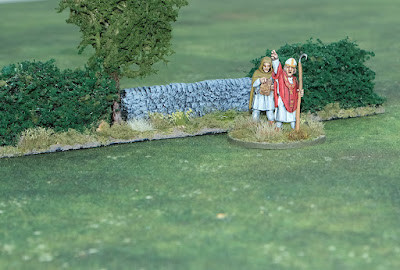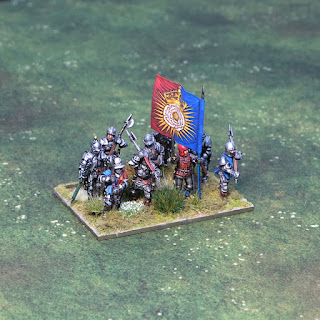In our small corner of England, 1472 has already become a period of heightened tension and conflict between the neighbouring Piggy Longton (Lancastrian persuasion - Lord Darcy) and West Rottington (Yorkist persuasion - Lord Trebian).
On New Year Day, Trebian raided the food storage on Lord Darcy’s estate and some weeks later, Lord Darcy counter raided West Rottington, to recover the feed and to punish Lord Trebian by setting fire to a barn.
These local ‘tribal’ tiffs have been ongoing for some years and the positioning of the two local magnates has become increasingly impassioned. But, today there is a change in the dynamic of good old fashioned rivalry ….. Edward (Yorkist rival for the throne) is on his way to Piggy Longton for ‘discussions’ with Lord Darcy.
Last Year (1471) Edward had gone into open rebellion against King Henry, with the large battles of Barnet and Tewkesbury testing the King’s ability to hold onto power. After the Lancastrian loss at Barnet, King Henry was captured and placed in the Tower, leaving Edward controlling the capital.
Unfortunately for the Yorkist cause, Queen Margaret raised another Lancastrian army to march on London, intent on releasing the King. The armies met at Tewkesbury and Margaret defeated the Yorkists, resulting in King Henry’s return to power.
[Both of these battles were played out as boardgames and covered on this blog - the links to the battle reports are in the Resource section below].
It now seems that Edward is once again circulating in England to stoke rebellion and has entered this region to recruit to his cause.
He can naturally count on the support of fellow Yorkist, Lord Trebian and while he has no reason to believe that Darcy will support him (they fought against each other last year), his reason for visiting Piggy Longton today is to threaten and intimidate Lord Darcy rather than court his favour.
 |
| A herald accompanied by an archer |
Heralds had already arranged the agreed meeting, which was to take place on the Smoggy Bank Bridge over Smoggy Brook.
Edward had arrived at the rendezvous with both pike (French ‘long spear’) and crossbowmen - he wanted to demonstrate that he had foreign support, with foreign troops and the enhanced war chest that goes with that.
 |
| Darcy (left) in an uneasy meeting with Edward |
Darcy attended with a group of Men-at-Arms, a selection of his most trusted men, who as a bodyguard would fight to the last if necessary. Both men had taken the pre-caution of having cavalry nearby, out of the way, but close enough should the diplomatic mission deteriorate into a hurly burly!
As the two men conversed on the bridge, Edward, in no uncertain terms described King Henry as a weakened king, who would be defeated this year and he pledged that if Darcy came over to him now, he would keep his lands ….. if not he would die on the battlefield and his estates be given to Trebian!
Lord Darcy, aware that King Henry still enjoyed significant, though not overwhelming support and that Edward was in a precarious position, still desperately recruiting, told Edward that he was obligated to serve the rightful King of England and that he would not be drawn into a treasonable act.
“I am loyal to mine own king, whoev'r t is yond hast the right to holdeth yond title”.
Darcy was careful to word his response in a way that did not commit himself to Henry the person, but rather to the crown and by implication, showing that should Edward take the crown and become legitimate King, then he, Darcy, would be an equally loyal servant to Edward.
If that was intended to pacify Edward, it spectacularly failed, Edward turning away in temper to end the meeting, growled;
“Thy chance to standeth by mine own side hast hath passed - from h're on, I consid'r thee mine own foe”.
Edward and his small contingent left the hamlet and returned to their camp at West Rottington.
With a sense of foreboding, Darcy immediately dispatched Sir. John Delves to appraise Somerset (4th Earl) of the meeting and to seek urgent military assistance.
“The king wilt beest madeth acknown yond edward is actively recruiting”.
It was essential that the king be told at once, but how best to do that to ensure secrecy and the safety of his envoy to guarantee the delivery of the information, when the countryside held such dangers, brought by divided loyalties? Threat of ambush was everywhere.
The answer presented itself later at vespers ….. Divine inspiration thought Darcy!
The Bishop of Dungborough (Stephen the Fearless) and Friar Evian would travel towards London, on the pretence of visiting the Arch-Bishop of Canterbury on matters of the church. That should at least get them safely into the capital. From there-on-in, the Bishop would have to use his initiative.
 |
| Stephen the Fearless with Friar Evian |
Darcy set about fortifying the hamlet, employed his armourer and blacksmith to their trades for the benefit of the levy being called up and he prepared his son, Sir. James for his first major military command.
With so many parts in motion, nothing was certain - England was close to being plunged once again into another year of civil war. Just how will this unravel?
Resource Section.
Previous account of the Battle of Barnet. LINK
Previous account of the Battle of Tewkesbury. LINK
My sister webspace ‘COMMANDERS’ is being re-configured to showcase various figure and boardgame systems that I am enjoying and gives a flavour of where current projects are up to. Link.


Further greatness from Piggy Longton, I am on the edge of my seat already, awaiting more!
ReplyDeleteThanks Phil, there are a few different things going on here, some I will decide by dice ….. so even I am in the dark at the moment :-)
ReplyDeleteCracking background 'fluff' there Norm and, like many others I'm sure, eagerly await the outcome of local events:).
ReplyDeleteHi Steve, possibilities to go off in different directions here, but having left 1471 behind us and in unchartered waters at the national level, there is a freedom to take this in any direction.
DeleteOh a scene setter 😄brilliant. So looking forward to the next chapter.
ReplyDeleteHi Graham, a good springboard for the Men of Longton!
ReplyDeleteI’m backing Lord Trebian from here on in. Go York!
ReplyDeleteHi JB - the good money says that he presently has the hitting power thanks to Edward ….. but is Somerset on the way with anything meaningful? Last time Somerset turned up, he was a tad late and saw Darcy defeated!
DeleteDelighted to hear that the Piggy sagas go on!
ReplyDeleteBest Iain (caveadsum1471)
Hi Iain, probably a little ‘recruiting’ needs to go on ready for this escalation :-)
DeleteBetter even than The Archers!
ReplyDeleteHi David, too kind :-) Mrs. Wargamer, an avid Archers fan, enjoyed your comment very much
DeleteFun bit of story telling. Great pics as well. Did people really talk like that back then? 😀
ReplyDeleteHalf the nobility probably still spoke French Stew!
DeleteThanks Stu, I use a Shakespearean translator app ….. so who knows :-)
ReplyDelete"Shakespearean translator app " surely we live in an age of miracles 😁
DeleteIndeed - though worse might be that I trust the screen that talks to me :-)
DeleteMore exciting machinations from Piggy Longton, Norm - I love it! If so inclined, you could even bring in a side "campaign" of semi-RPG skirmish games, as the good Bishop navigates his way to London, passing through potentially hostile environs and getting past Yorkist sympathisers en route?!
ReplyDeleteHi Keith, I do need to consider Stephens journey and of course, with hime being ‘fearless’ there might be good opportunity for a scrap!
DeleteGreat background story Norm!. That Edward is certainly a prickly man! Poor Darcy is stuck between a hammer and an anvil. Hopefully for him the hammer misses.
ReplyDeleteThanks Ben, Darcy must sometimes wonder whether there isn’t a quieter corner of England that he would rather be ….. but where is the fun in that :-) With trying to to ground at least part of all of this in history, ultimately we must either have either Edward or Henry, there can never be peace while both are around!
ReplyDeleteWhat ever happens Norm I suspect fighting will breakout ! Peace and harmony is boring and over rated
ReplyDeleteHi Matt, Annora Fletcher, a columnist for the Dungborough Chronicles is saying that there is every prospect of ‘Peace in our timeth’ - but she also foretold 1471 as being the year of two kings and she got that wrong - so who knows!
ReplyDeleteGreat WotR gaming, Norm. Makes me want to revisit this period again.
ReplyDeleteThanks Dean, there is much to like.
ReplyDeleteHi Aaron, this could go in so many ways … plans are still being hatched!
ReplyDelete